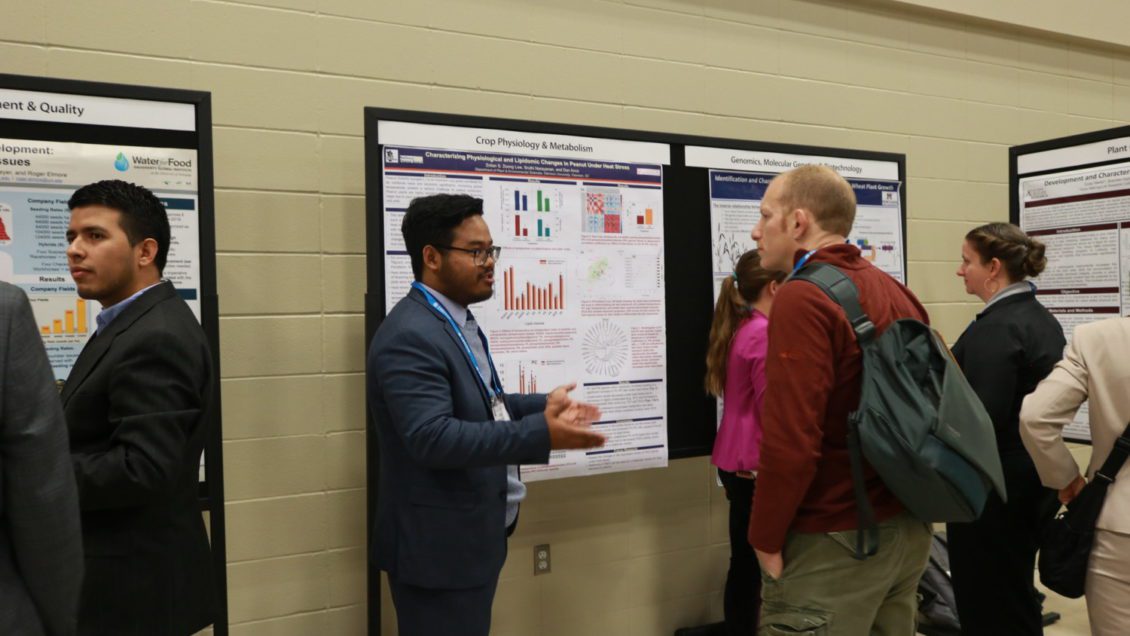
San Antonio, Texas – Three graduate students from Clemson University recently won accolades for their outstanding research presentations at the American Society of Agronomy-Crop Science Society of America-Soil Science Society of America (ASA-CSSA-SSSA) International Annual Meeting.
The students and their professors attended the four-day meeting from Nov. 10-13, and students of the Department of Plant and Environmental Sciences won the following awards:
- Bhupinder Singh Jatana, who competed in the soil fertility and plant nutrition division’s PhD oral competition, first prize.
- Sukhmanpreet Kaur, who competed in the crop physiology and metabolism division’s oral competition, third prize.
- Zolian Zoong Lwe, who competed in the crop physiology and metabolism division’s five-minute rapid-fire talk and poster competition, first prize.
The Tri-Societies’ meeting boasts approximately 4,000 international members and attendees a year, from distinguished scientists to ambitious students pursuing degrees in the agricultural or environmental sciences. The meeting provides members with opportunities to network, showcase new research, and compete in public speaking competitions for awards.
“It was an excellent opportunity for me to be a part of this research,” said Kaur, whose presentation focused on the ag yield benefits of Arbuscular Mycorrhizal Fungi. “Getting the third position in this competition was entirely due to my research and my professor’s guidance.”
Kaur works with Vidya Suseela, assistant professor of soil ecology at Clemson, and studies methods to maximize the benefits of phosphorus already present in soil microbes, reducing the need for fertilizers.
Kaur also found the meeting to be a great vehicle of learning.
“Competition makes us better as you put in a lot of effort to give your best, which ultimately helps us in achieving our career goals,” she said.
The meeting brings together scientists from around the world to seek viable solutions to modern issues facing the botanical, agronomical, and environmental sciences. The theme for 2019’s meeting was “Embracing the Digital Environment.”

“We’re fortunate to live in the age where technology has come so far that we can use the latest technology to probe into complex problems in ways we never were able to do before,” Zoong Lwe said. “For example, when you’re dealing with biology and there’s so much layer, complexity that you need high computing power to really parse through that information. And so that is one example of embracing that digital environment, using… the powerful computers we have now to try to answer these complex questions.”
Zoong Lwe, who plans to graduate in the spring after two-and-a-half years with Clemson University, is researching how to identify biomarkers in peanuts for heat tolerance. South Carolina is located in the “U.S. peanut belt,” which produces the third highest yield of peanuts in the world, and the state is presently learning how to tackle environmental stresses like heat.
“A lot of the time in these scientific conferences, people are able to present what is most current in their lab, things that may have not necessarily hit the published literature yet,” Zoong Lwe said. “So that gives you a preview of what’s current.”
Sruthi Narayanan, assistant professor at the Department of Plant and Environmental Sciences and advisor to Zoong Lwe, said that the meeting exists to tackle global existential problems.
“One of the grand challenges we have today is developing climate resilient crops and cropping systems which can support global food security and sustainable development,” she said.
Narayanan is a ten-year veteran of the annual meeting.
“It is important for Clemson to have its presence at this annual meeting to affirm its commitment to sustainable and resilient agriculture and food systems,” she said.
Jatana said one benefit of the conference was getting to connect and collaborate with the scientific community within his field.
“You have a lot of other opportunities like the workshops. Especially this year they hosted the graduate student leadership conference… for developing their leadership skills. And that was awesome. I attended that conference and learned a lot of things from there. The most important thing that I think will help me a lot in the future was how we can resolve the professional conflicts, when we are working in a big group,” he said.
Jatana, who works with Nishanth Tharayil, professor of plant ecophysiology at Clemson, presented on why organic byproducts are a better alternative to fertilizers for phosphorus mobilization in plants. As a grad student, his research focuses widely on nutrient management and soil fertility.
“They invited speakers from big TV channels and professionals in the fields of leadership development. It was amazing listening to those people and getting to know from their experience how to build your own skills,” he said.
Jatana, who was the only student to win prize money, said he plans to spend it on professional development. He plans to attend another ASA conference in February.
-END-
The American Society of Agronomy has met since 1907 to rally some of the great minds in the biological sciences, with the Crop Science Society of America and Soil Science Society of America joining in 1936. The venue opened its doors for the first time in Chicago on New Year’s Eve.
The 2020 International Annual Meeting will be held on Nov. 8-11 in Phoenix. Its theme is “Translating Visionary Science to Practice.” Interested parties can register online through their website.
Get in touch and we will connect you with the author or another expert.
Or email us at news@clemson.edu

